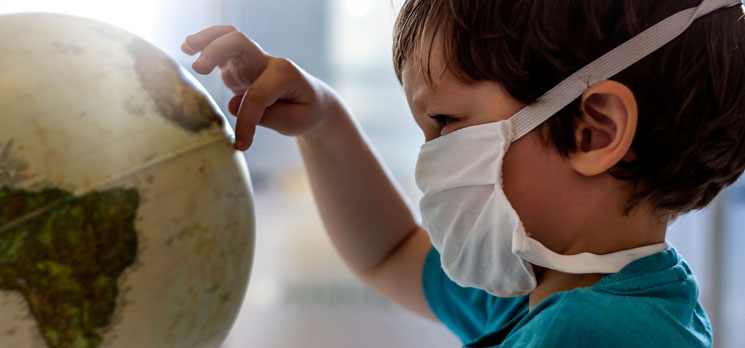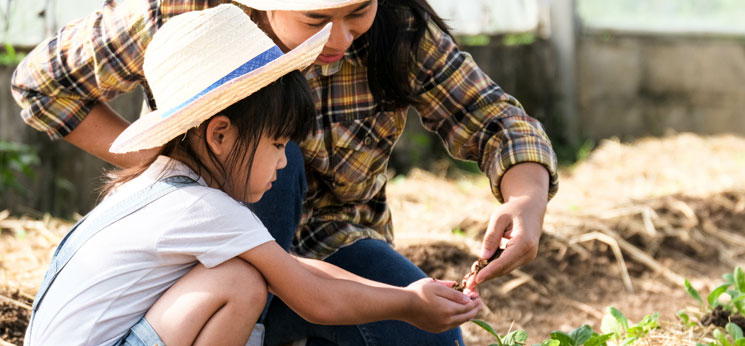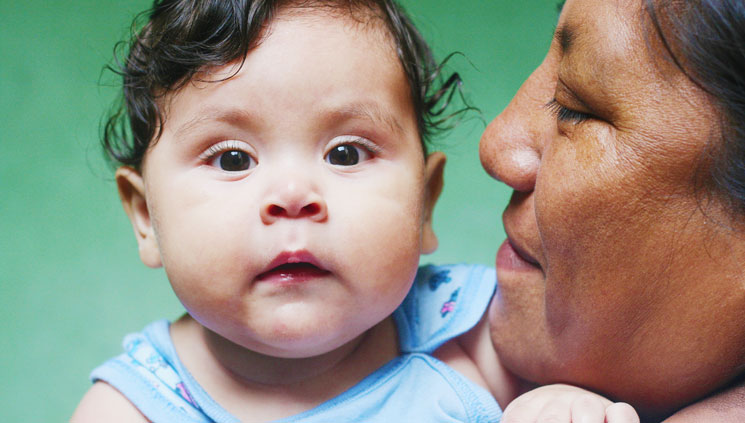Sign on for a green childhood
The Atkinson Centre's Summer Institute this year shined a light on climate change and sustainability within the early years. Experts in the areas of climate action and sustainability, green and net-zero carbon engineering, outdoor learning environments, equity, race and anti-racism, Indigenous land-based learning, early years curriculum, early childhood education practice, and building capacity and partnerships, came together at a roundtable in Montreal this last June.
Working together across sectors that often do not cross-pollinate, a call to action was drafted for governments and those within the early years: build climate goals and sustainability into early childhood education curriculum, legislation, and government spending.
CHILDREN HAVE THE RIGHT TO A HEALTHY ENVIRONMENT
and elected officials have a responsibility to make it happen

The Canada-Wide Early Learning and Child Care (CWELCC) system is in development at the same time as the world is in a race against climate change. People are looking to the United Nations Climate Change Conference 2022 and action on the 2021 Glasgow Climate Pact, and its promise to turn the 2020s into climate action and support.
The Atkinson Centre for Society and Child Development Summer Institute in partnership with the Encyclopedia on Early Childhood Development (EECD) brought together a cross section of experts in areas of climate action, equity, urban planning, green engineering, early learning and sustainability, and Indigenous ways of knowing and being. Researchers and practitioners agreed: there is an urgency to act for the future of our children and our planet, and the chance to do so is now. They called on policy makers to ensure Canada’s climate goals are reflected in CWELCC spending, policy, and practice, including pending legislation for the establishment of a CWELCC system.
Why should climate change and sustainability matter to the early years sector?
A healthy environment is now recognized as a human and a child right.
The May 2022 UNICEF’s Report Card 17 specifically addressing environmental stressors on the well-being of children, ranks Canada 28 out of 39 rich countries. We stand alongside the worst of our peers in municipal waste and resource consumption, and 38 in the world at large – a measure that refers to broader aspects of both physical and policy environments that surround the child. Children are suffering now because of poor policy decisions. This recognition came in a precedent-setting ruling by a UK coroner concluding that air pollution led to the 2013 death of nine year old Ella Kissi-Debrah and calling for changes to environmental policy.

The impact of climate change is not evenly distributed.
What is bad for everyone is worse for women and children; what is bad for children, is worse for the youngest. Poor individual, societal, and policy decisions effect certain communities of children more than others: those living in poverty, Indigenous and northern communities, and those who are racialized.
The environmental challenge is greater than any one single stakeholder.
Governments must approach climate action in a concerted manner. Environmental degradation is an interconnected problem, requiring intersectional approaches. The complexity of the challenge necessitates the mobilization of every sector – including early childhood education.

Pro-environmental attitudes and behaviours are critical and foundational for effectively addressing climate change, and are developed by age 7.
Transformations in systems and policies, environmental awareness education, and the knowledge, attitudes, behaviours, practices, and beliefs that young children hold about the environment in their early years are now matters of survival. If we don’t teach our youngest pro-environmental behaviours and attitudes, we will continue the generational cycle of poor climate action.
What should governments do?
Incorporate climate goals in all sectors and within all public investments and expenditures.
The Federal government is investing $27 billion over the next five years to expand access to affordable child care. The spending of any public dollar requires a sustainability lens. Where new child care programs are located, how they are designed, constructed, and resourced, can either add to the problem of climate change or help mitigate it. This is an opportunity to ‘think green’, revaluate the status quo, and reset the sector to ensure sustainability and climate action are incorporated both at policy and program/classroom levels through legislative changes.

Incorporate sustainability and pro-environmental learning into early years’ curriculum.
Climate change impacts us all, but it is children who bear the weight of our errors. Changing attitudes and beliefs towards climate change and sustainability requires turning beliefs into actions and habits. Developing a reciprocal and respectful relationship with the land is now critical to our survival. Early years curriculum must not only support knowledge about the environment, but activism for the environment. These elements should be extended to family engagement to support not only the next generations, but to create behavioural change today.
Build reciprocal relationships and partnerships with Indigenous leaders and knowledge keepers and incorporate land-based learning into all aspects of the early years.
The very identity of Indigenous people is woven into their relationship with the land. Although their traditional way of life has contributed little to climate change, they are amongst the most adversely impacted.

While climate change continues to pose an increasing threat to the survival of Indigenous peoples, they continue to be excluded from policy decisions and climate negotiations and their wisdoms ignored.
Climate experts agree that one critical way to address the climate crisis is to empower Indigenous communities, and to support meaningful dialogue with Indigenous knowledge holders to determine sustainable and co-operative steps forward.
Keep climate action and sustainability as a top priority in community and urban planning.
Where child care centres are located is as important as how they are built and what happens inside them. The federal government’s refusal to allow its funding to be used to support early learning and child care programs offered by schools curtails efforts to create 15-minute neighbourhoods. Walkable communities are critical to reducing carbon footprints. Existing public infrastructure in schools, parks, and libraries should be leveraged to maximize their functions.

Use an equity lens in all policy decisions.
The climate crisis builds on the rampant inequities in our society. With racialized, marginalized, and Indigenous and Northern communities bearing much of the negative impact of climate change. How we plan and develop policies and neighbourhoods around climate change mitigation can either add to the inequity crisis or help ease it. For example, low-income neighbourhoods are much less likely to have green spaces and canopies and are more likely to be exposed to air-pollution. Incorporating the notion that a child has a human right to a sustainable, clean, and healthy environment was recognized by the United Nations Human Rights Council on October 8, 2021 and must be incorporated into legislation and policies.
We know we will never achieve a perfect world, but as young people, we will never stop fighting for a better future. To the adult allies and decision-makers, we ask, are you with us?
- Ella, Karel and Katie, youth climate advocates, UNICEF Report Card 17
Download the open letter in PDF format
Founding Signatories
Emis Akbari, Ph.D.
Professor and Program Coordinator, School of Early Childhood, George Brown College,
Senior Policy Fellow, Atkinson Centre for Society and Child Development and Adjunct Professor, Department of Applied Psychology and Human Behaviour, OISE, University of Toronto
Emis.Akbari@georgebrown.ca
Kerry McCuaig
Senior Fellow in Early Childhood Policy, Atkinson Centre for Society and Child Development, OISE/University of Toronto
Kerry.McCuaig@utoronto.ca
Isabelle Vinet, M.Sc.
Executive Director, Centre of Excellence for Early Childhood Development, Encyclopedia on Early Childhood Development – angle inégalités – impact sur les enfants vulnérables
Vineti@invite.umontreal.ca
If you agree with this statement, please add your voice and sign here.
Signatories
| Bonnie Chinn, Little Learning House, Early Learning + Care |
| Bonnie Chinn |
| Maureen Cullen, Mount Royal University |
| Shelagh Fleming |
| CLAIRE KRAATZ, For Our Kids Alberta |
| Gail Maiangowi |
| Gail Simpson |
| Connie Antonsen |
| Candiss Brown |
| Mariana Brussoni, Human Early Learning Partnership, UBC |
| Amy Dewar |
| Sharon Gregson |
| jenny kimble |
| Becky Kirkham, ECE |
| Arul Christy Madharasi Melvin |
| Sheri Mills |
| Ceyrah Morrice |
| Kelly Andrushko |
| Mia Elfenbaum |
| Susan Emerson |
| Tracy Hemming |
| Susy Komishin |
| Receive Bitcoin Cash. $2200 Available Now >>> https://t.me Receive Bitcoin Cash. $2200 Available Now >>> https://t.me |
| Neria Aylward, Jimmy Pratt Foundation |
| Immediate Bitcoin Payouts. $1500 Available. Click To Claim: Immediate Bitcoin Payouts. $1500 Available. Click To Claim: |
| Marina Arantes |
| Keileigh Barrett-Harvey |
| Valérie Bell, CEECD |
| Jane Bertrand |
| Judith Bishop |
| Janet Blaxall, RECE |
| Kristi Block, Mothercraft |
| Magali Bouhours |
| Vanessa Comtois |
| Michelle Crogie |
| Sara Cunningham |
| Geoff Day |
| Zeynep Dere , Assoc. Prof. |
| Tanya Halsall, University of Ottawa Institute of Mental Health Research |
| Jennifer Hepditch |
| Catherine Hewlett, . |
| Lucia Hogeveen, Wcdwb |
| Nagesh K |
| Lalitha Kalyan |
| Jan Kasperski, Resilient Kids Canada |
| Manpreet Kaur |
| Harsimranpreet Kaur |
| Lovepreet Kaur |
| Bill Kennedy, The Learning Enrichment Foundation |
| Prak Kosal |
| Jodilyn Kukkee |
| Afia Kyei , Algonquin College |
| Carla Mendez |
| Suzana Miletic |
| Stacey Mudie, University of Toronto |
| Sarah Rudolph, Mary Ward Centre |
| Raymond SAMUEL |
| Stuart Smith |
| Sarah Soikie |
| Julie Strom |
| Lisa Tabachnick |
| Connie Winder, George Brown College |
| Lisa Wolff, UNICEF Canada |
| Tennelle Wong |
| Damian Wong |
| Cheryl Armistead |
| Karine Barrette |
| Jacinthe Beaudin |
| Alexandra Beauregard |
| Luce Bordeleau |
| Marie Melanie Bot |
| Jessica Coulombe |
| Awa Fofana |
| Louise Fortin |
| Martine Gobeil |
| Christa Japel, UQAM |
| Mohamed Kajeiou |
| Hadil Kawmi |
| Nadine Kioni |
| Stéfanie Labrecque |
| Nadia Lanteigne |
| Jessica Lefebvre |
| Alexandre Legault |
| Kristell Le Martret |
| Anick Lévesque-Gravel |
| Ines Lopes, Éducatrice à l’environnement et psychologue |
| Hubert Mansion, L'Université dans la Naturee |
| Marie-France Marcil |
| Sylvie Melsbach, RCPEM |
| Delphine Moreau |
| Michelle Normand, Nacelles & Co |
| Michelle Normand |
| Jasmine Paradis |
| Nadia Paree |
| Naomi Pastrana, McGill |
| claude poitras |
| Marie-France Primeau |
| Francisco Quiazua |
| Emmauela Remy |
| Michelle Roux-Bordage |
| Manon Roy |
| Myriam Sauriol |
| Guillaume Turcotte |
| Katja Valois, UdeM et CRCHUSJ |
| Marike Vanderheyden |
| Valerie Varin |
| Anne-Marie Viens |
| Anqi Wang |
| Aladesanmi Abiola |
| Olusayo Bello, Ministry of Women, Children and Social Affairs |
| Nohora Corredor |
| Mintu Dazel |
| Lisa De Cespedes |
| Beatriz Ferraz |
| catherine giquel |
| Catarina Gonçalves |
| Floriane Herreman |
| Aly Jua |
| NADINE KIONI |
| Margaret Merrill |
| Janine Nascimento |
| GEMA PANIAGUA |
| Monique Poubel |
| rebecca riess |
| Marc-Edwens THÉLUSMA |
| Y torres |
